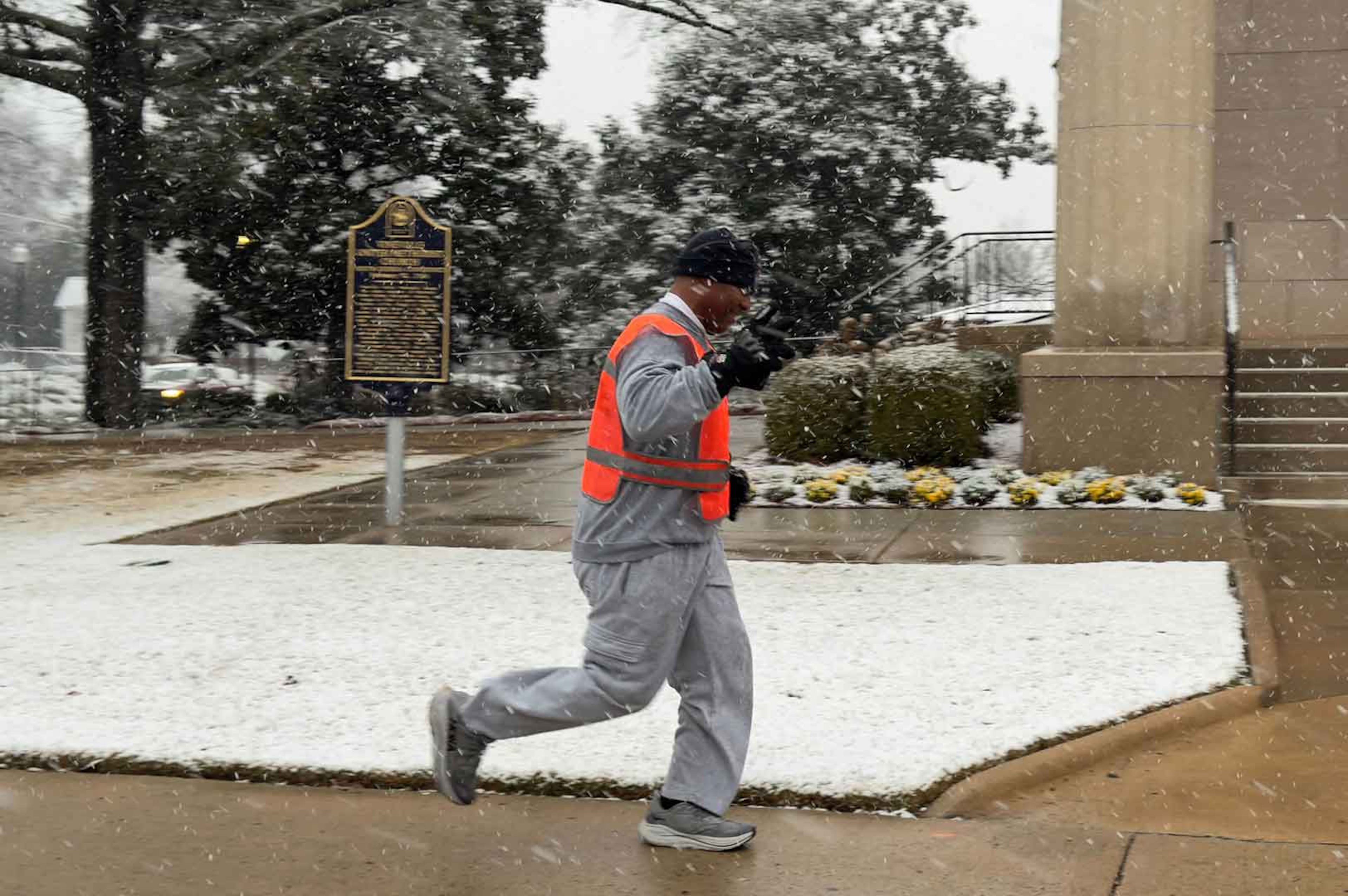New schedule for Grady medics triggers backlash
Johnny Ransome, an EMT who worked for Grady EMS for 11 years, spent days where he couldn’t relax at home or shift from a hyper-vigilant state from the urgency of having run call after call, with no breaks.
Meanwhile, certain calls stayed with him that involved instances in which children died or were raped, or mangled bodies were pulled out of car wrecks.
“It affects you, it reverberates,’’ Ransome said.
Finally, as Grady extended ambulance coverage to several cities in south Fulton last year, Ransome quit, unable to endure the stress of the workload.
Across the emergency medical industry, the emotional toll on medics resulting from their long hours and the pressures of dealing with life-or-death situations is being recognized as a critical concern.
» RELATED: Ambulance delays continue to put south Fulton lives at risk
» MORE: Grady taps profits, controversy in EMS expansion throughout Georgia
The issue has come to a boil at Grady, where its medics last year handled more than 160,000 calls in Atlanta and several cities in south Fulton. In addition to the local service, Grady runs ambulance crews in more than a dozen other Georgia counties. But nowhere else in the state are call volumes so high, and emergency needs so critical, as in Atlanta, EMS experts told the AJC.
To keep up with the public's demand for ambulances, Grady this week is instituting new work schedules, which management has touted as a means to reduce fatigue and excess hours.

But the new schedules instead have triggered a backlash among some medics. They say the schedules will worsen the pressures they face and, as a result, the risks to the public.
“This (schedule) will increase fatigue, collisions and safety incidents,’’ said Max Gunn, who has worked as a Grady medic for more than seven years. “That’s just the physical, tangible wounds this is creating.
“This doesn’t even touch the mental health and quality of life issues.”
Grady administrators declined an interview. But in a written response to questions from the AJC, executives said that EMS employees had been consulted for weeks before the new schedule was adopted.
“We had multiple employee engagement meetings for staff to offer input surrounding the shift configuration,’’ Grady administrators wrote. “Many of their requests were implemented.”
That’s not what Grady senior paramedic David Lemire and some other medics said happened. Lemire, who was also a training officer for Grady, quit over the new schedules. He said that Grady is not giving enough consideration to the welfare of its crews.

He points to a fellow medic he knew was in danger. The medic confided to him that he was consumed by suicidal thoughts, Lemire said. As a precaution, the medic told Lemire that he had removed his firearms from his home, and that he had begged supervisors to give him time off work to try to recover.
Yet for months, he was ordered back into an ambulance, Lemire said.
“People are hurting, crying out loudly for help, but no one is helping them,” Lemire said. “It’s hurtful and shameful. In the end, it will be the people of Atlanta that will ultimately pay, though they may never realize it.”
Grady, however, told the AJC that it is sensitive to the job stresses employees face and that it offers various resources to help them cope, including critical incident stress management and crisis intervention. “Grady gives great consideration to the health and well-being of all health system staff,” a Grady spokeswoman wrote in an email response to the AJC.
Unsafe schedules
Work schedules are a particularly sensitive issue among emergency medical personnel. Labor statistics point to EMS as having one of the greatest occupational hazards of any profession, due to the exposure to trauma. A 2015 survey also showed that paramedics and other EMS employees are 10 times more likely than most adults to contemplate suicide. A recent study also found significantly higher suicide rate among EMTs.
To cope, medics need a sufficient recovery or cool-down period, said Thomas Woodruff, a former paramedic and owner of Faithful Guardian Training Center in west Georgia. That's why ambulance providers in every part of the state must consider the mental health impact of schedules, he said.

“With high-intensity services, that’s even more important,’’ said Woodruff, who also chairs a special committee that is developing an initiative for the state’s EMS Council in west Georgia on mental health and wellness services to EMS employees.
For years, Grady lured medics with a work schedule of four days off after three days on duty. In the past, Grady also sweetened the deal by offering additional pay to medics who managed to respond to a maximum threshold of calls within a 24-hour period.
Medics from neighboring states traveled to Atlanta to take advantage.
In recent years, however, demands from call volumes that increased year after year became a greater burden on medics, who were asked to work longer hours to keep pace with the workloads.
The new Grady schedule requires medics to work four days in a row one week, followed by three days on alternative weeks. That will amount to more than 100 additional hours a year in scheduled time, compared to the previous schedule.
» RELATED: Scant resources undermine EMS in Georgia
Grady told the AJC that the new schedule reduces regular shifts by one hour and will allow workers to be able to leave their shifts on time. A flier distributed to employees also stated that the new schedule likely would not place a demand on them to work hours beyond their regular shifts.
But some medics said they doubt that instances in which they will have to work more hours will be avoided,because no one can predict how many sick calls by co-workers would require others to fill in. Others also said that a shortage of ambulances in the city means they must run calls for up to two more hours after their shifts.
Senior medics also were angered by the system for awarding shifts. Under that system, employees had to submit “bids” for shifts, with the more attractive schedules going to those with fewer absences and disciplinary notices. That primarily benefited new hires with no work history, Lemire said.
"People are hurting, crying out loudly for help, but no one is helping them. ... It's hurtful and shameful. In the end, it will be the people of Atlanta that will ultimately pay, though they may never realize it." —Grady senior paramedic David Lemire
He wrote to supervisors, cautioning that the schedules would prompt many senior staff to seek jobs at providers with more attractive schedules. The letter also said that the exhaustion of crews was creating a danger to patients.
Weeks later, when he picked up his new schedule, he was notified that he would be required to work weekends. He almost immediately started looking for another job. He told the AJC his last day at Grady was Wednesday.
Another paramedic, a single mother, sent in a resignation after she was told that her bid choices were not available, two medics told the AJC.
Erin Vickery, Grady EMS director of operations, did not respond to a call and a written request for comment.
Others involved in emergency medical services also expressed concerns about the new schedule.
» MORE: State has critical shortage of paramedics
» MORE: EMS in Georgia due for overhaul
Just one more consecutive day of work will have a profound effect on the “sanity of these Grady medics,” said Graham Westerman, a former military air medic who spent years as a Grady paramedic.
Westerman, who now teaches EMS, said he couldn’t imagine the toll. Most of the Atlanta area street crews push for up to 15 hours a day, working back-to-back calls of patients who are shot or in cardiac arrest. They have little time for breaks, if any at all.
“It’s one call right after another,’’ Westerman said. “After you do that for hours, you make mistakes.”
“What you’re doing is putting not only medics at risk but you’re putting the public at risk.”
Keith Cates, a former paramedic who is helping develop the EMS mental health and wellness initiative in west Georgia, said ambulance providers need to recognize the risk of trauma for medics.
On the job, "I've been shot at, I've been attacked," said Cates, now an associate professor of clinical mental health counseling at Troy University in Alabama. "And do you mean to tell me I'm not potentially traumatized? Tell me, how could I not possibly avoid the traumatic exposure. I could not do so."
A rest period between high-intensity shifts is necessary to maintain efficiency and mental alertness, Cates said. Meanwhile, extended periods of intensive shifts will lead to exhaustion and work-related impairment, he said.
Little trouble filling positions
Grady disputes that the new schedules have prompted any resignations. Unlike other ambulance providers, it also said it has had little trouble keeping positions filled.
Only seven positions remain open, administrators said. The metro Atlanta crew is made up of roughly 85 paramedics and 98 EMTs.
Gunn, the long-time medic, said that Grady has been filling some open positions with graduates of a training academy it operates. In recent weeks, classes of 30 medics each were introduced into the ambulance bays.
“They started preparing for people to leave,” Gunn said.
Many of them have spent as little as 30 days on the streets with patients, Lemire said.
His spot on the truck, Lemire said, is likely already filled by one of them.
EMS and mental health
In Georgia, medics, as well as first responders, have few places to turn for help when trying to deal with the work-related trauma.
Most providers offer an employee assistance program, which typically allows medics up to three telephone counseling visits. However, EMS leaders say the program is woefully inadequate.
Most medics on their own can’t afford therapeutic assistance for dealing with symptoms related to PTSD and trauma, experts said. And first responders who may suffer from PTSD may not qualify for worker compensation or disability benefits.
To address the concerns, a mental health and wellness initiative is being developed by EMS leaders in west Georgia’s EMS Region 4. The initiative includes several components, including a means to provide easy access to mental health services to first responders and a curriculum for students who enroll in EMS programs.
Leaders hope the effort, modeled after a resiliency program of the National Association of Emergency Medical Technicians, will ultimately be expanded to other parts of the state.
The initiative is expected to be approved by EMS Region 4 leaders in April.



